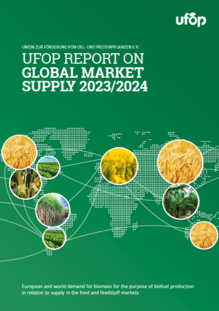Climate change highlights the time and pressure to act for the sustainable intensification of resilient crop rotations
UFOP publishes updated report on global market supply
On the occasion of the publication of the updated edition of the "UFOP Report 2023/2024 on Global Market Supply", the Union zur Förderung von Oel- und Proteinpflanzen e. V. (UFOP) is calling for the sustainable intensification and development of climate-resilient crops and crop rotations. The consequences of climate change, which are already visible today, make it necessary to realise the production and genetic yield potential as quickly as possible.
 This is absolutely necessary so that agriculture can continue to fulfil its importance as a supplier of food and animal feed and as a producer of renewable raw materials for energy and material use in the future. In this context, UFOP refers to the comprehensive legal requirements enshrined in EU and national law, which must be observed in the interests of sustainable cultivation. However, the association criticises that these requirements lead to competitive disadvantages in international comparison and therefore calls for fundamental harmonisation. The development of innovations in the field of breeding should no longer be slowed down in order to achieve greater sustainability in cultivation and minimise productivity losses due to increasing climate change.
This is absolutely necessary so that agriculture can continue to fulfil its importance as a supplier of food and animal feed and as a producer of renewable raw materials for energy and material use in the future. In this context, UFOP refers to the comprehensive legal requirements enshrined in EU and national law, which must be observed in the interests of sustainable cultivation. However, the association criticises that these requirements lead to competitive disadvantages in international comparison and therefore calls for fundamental harmonisation. The development of innovations in the field of breeding should no longer be slowed down in order to achieve greater sustainability in cultivation and minimise productivity losses due to increasing climate change.
UFOP fears that it is precisely in this area that the EU is currently falling behind internationally. The way must be cleared for new breeding technologies such as genome editing in terms of securing yields or with a view to the yield potential that may still be leveraged, the promotion union emphasises, particularly with a view to the 16th Global Forum for Food and Agriculture to be held in Berlin from 17 to 20 January 2024.
UFOP emphasises that global production is still mathematically sufficient to feed the growing world population, although some of it is used, for example, as a renewable raw material for material or energy use. The quantities of raw materials used for non-food purposes are also a supply buffer for the food market. This was proven by the generally secure supply of vegetable oil at the beginning of the war against Ukraine.
UFOP fundamentally criticises the fact that the evaluation of crops is still too limited to their main use as food, animal feed or as a renewable raw material. Rather, it is important to consider the combined use of the products resulting from processing, such as protein feed in biofuel production or the options for expanding crop rotation systems, particularly in Europe, with nitrogen-fixing legumes and oilseeds. On this basis, ecosystem benefits could be defined for a funding framework that remunerates these benefits and thus creates incentives for diversification that promotes biodiversity, emphasises UFOP. With regard to the National Biomass Strategy (NABIS) currently under discussion, the mistake of dividing up or distributing raw material potentials as if with a cake slicer in terms of acreage and end use must be avoided. This approach is completely unrealistic and ignores the fact that the EU internal market is an open market in which the flow of goods is regulated not least by supply and demand, which ultimately determines the price. This is also a driver for securing global market supply, the UFOP states.
The report is available for download.
Here, the complete press release can be downloaded.
All graphics are available as individual graphics via download (zip file). We will be happy to send you graphics as press graphics on request to info@ufop-mail.de.


 Union zur Förderung von Oel- und Proteinpflanzen E.V.
Union zur Förderung von Oel- und Proteinpflanzen E.V.